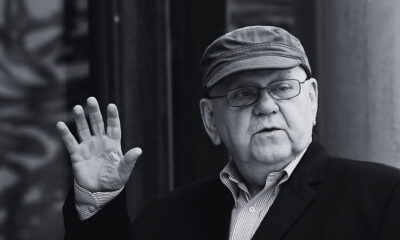Bosznia
LOPOTT TÁRGYAK OSZTÁLYA: Állítólag Ukrajnából származó ikont ajándékoztak a boszniai szerbek az orosz külügyminiszternek

A szarajevói ukrán nagykövetség hivatalos jegyzéket intézett Bosznia- Hercegovina külügyminisztériumához, amelyben kéri, hogy “nyilvánosan, haladéktalanul és minden kétséget kizáróan” közöljék, miként jutott Milorad Dodikhoz, a bosznia-hercegovinai elnökség szerb tagjához, és jelenlegi elnökéhez az az ikon, amelyet az orosz külügyminiszternek ajándékozott. Az ügy nagy port vert fel Bosznia- Hercegovinában, az ukránok szerint ha az ország nem tisztázza az ikon eredetét, azzal az Ukrajna elleni agresszív orosz politikát támogatja.
A nagykövetség szerint az ikon Ukrajnát illeti meg, mivel egy 300 éves aranyozott ortodox alkotásról van szó, amely az ország kulturális örökségéhez tartozik.
Az ikonon jól látszik a viaszpecsét, amely szerint Ukrajnában vették nyilvántartásba valamikor régen, amikor az ország még a Szovjetunióhoz tartozott.
Szarajevói sajtójelentések szerint az ikon Luganszk környékéről származhat, amelyet az ukrajnai oroszbarát szeparatisták felügyelnek.
Bisera Turković, a bosznia-hercegovinai minisztertanács külügyminisztere, volt budapesti nagykövet, megerősítette, hogy megkapták az ukrán nagykövetség hivatalos jegyzékét, amelyet tovább küldtek az elnökségnek.
– Abban bízom, hogy Bosznia- Hercegovina részt vesz a probléma megoldásában. Tegnap, miután megkaptuk a jegyzéket, azonnal továbbítottuk az elnökségének. Helyénvaló lenne a nagyon gyors reakció, mert egy nagyon komoly jegyzékről, illetve vádról van szó. Óriási károk károkat okoz Bosznia- Hercegovinának a vád, hogy egy magas rangú tisztviselő olyasmit adományozott, amit elloptak, illetve ami másnak a kulturális örökségét képezi. Sürgősen meg kell indokolnunk, hogy ez miként fordulhatott elő.
– mondta a bosznia-hercegovinai külügyminiszter.
Az ukránok azt üzenték, hogy ha nem kapnak információkat az ikonnal kapcsolatban, akkora arra úgy tekintenek, hogy Bosznia- Hercegovina támogatja az Orosz Föderáció agresszív politikájának és Ukrajna elleni katonai akcióit, amelyek már több ezer ukrán állampolgár életét követelték.
Bisera Turković szerint nem kizárt, hogy az ügy tisztázásába bevonják az állami nyomozóhatóságokat és az ügyészséget is.
A Luganszk és Donyeck környékén harcoló oroszbarát félkatonai alakulatokhoz boszniai szerb önkéntesek is csapódtak.
Egy Gavrilo Stević nevet viselő férfi ellen most is eljárás folyik, Bosznia- Hercegovina törvényei ugyanis tiltják a külföldi félkatonai alakulatokhoz való csatlakozást.
-

 Szerbia7 nap telt el azóta
Szerbia7 nap telt el azótaDodik tagadja a srebrenicai népirtást, Vučić pedig küzd a boszniai szerb álláspontért
-

 Szerbia6 nap telt el azóta
Szerbia6 nap telt el azótaA jelek szerint Szerbia nemcsak Ukrajnának, hanem Izraelnek is szállít fegyvert 🇮🇱🤝🇷🇸
-

 Szerbia5 nap telt el azóta
Szerbia5 nap telt el azótaMagyarország nem támogatja Koszovó ET-tagságát, sem a Srebrenicáról szóló ENSZ-határozatot
-

 Szerbia5 nap telt el azóta
Szerbia5 nap telt el azótaCsapást mérhet-e a szerb Panda a kínai elektromos autókra?































































